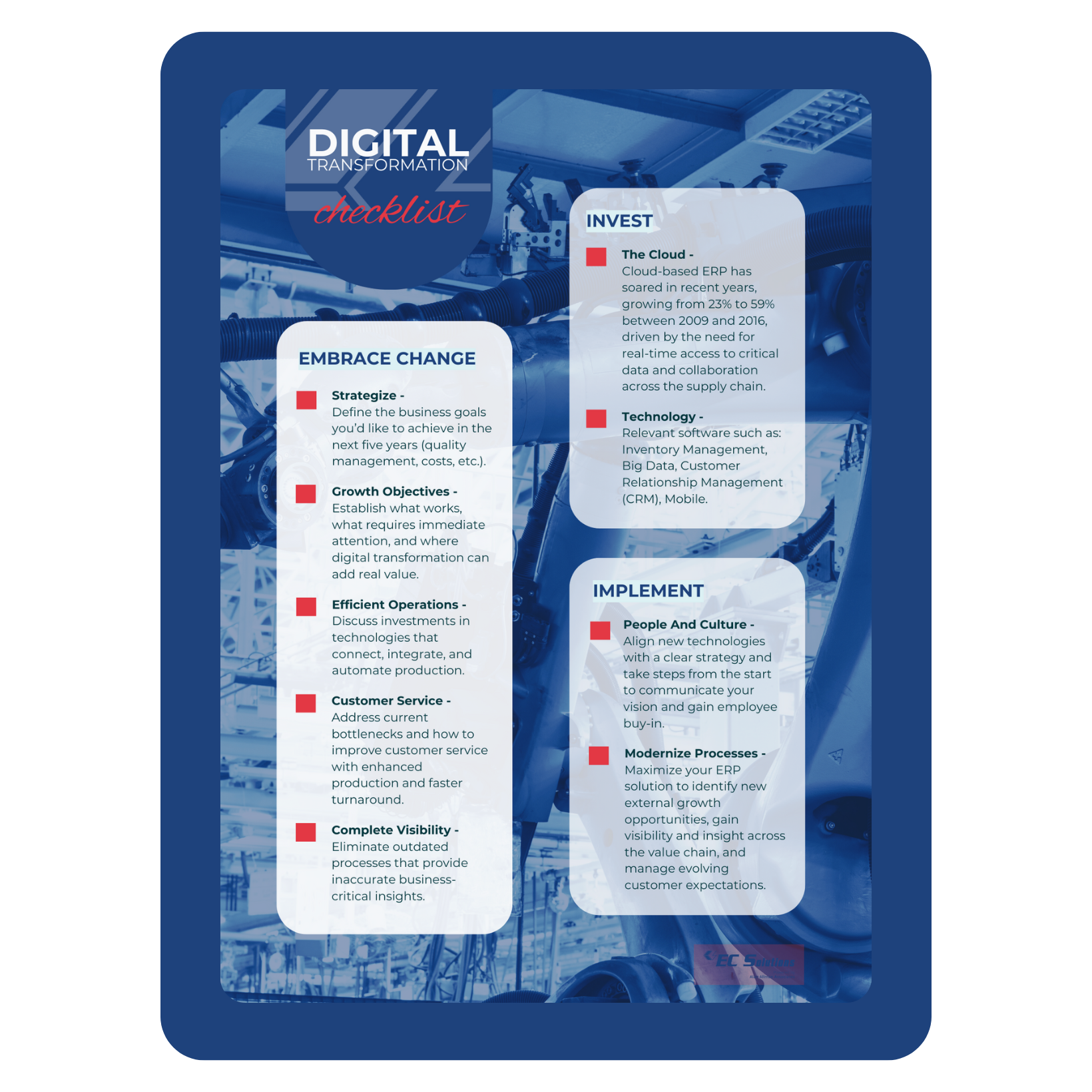ERP and Digital Transformation: The Future Of Manufacturing
Whether you’re starting from the beginning or looking to make improvements to certain business processes – supply chain, inventory, production – streamlining your organization should always be front of mind.
This is particularly pertinent for manufacturers as they work to gain the upper hand in a very competitive market. Unfortunately, many companies are reluctant to invest in new technologies to get them to where they need to be.
Why Digital Transformation?
A common business strategy that is making waves in the corporate world is digital transformation. It incorporates digital technology from A to Z, so that an organization can have complete visibility and control of all processes.
While it is a huge undertaking to restructure activities and operations as well as a large financial investment, the value of growth and the future benefits outweigh any preliminary frustrations.
And in an age where everything is automated, businesses can’t afford to lose out on revolutionary tools by staying in the status quo.
Now, it doesn’t mean that businesses need to run to the nearest vendor and buy all types of software to fulfill their objectives. The key lies in knowing what’s the most important basis and then growing from there.
For manufacturers, digital transformation should begin with ERP software. It’s a unique system that merges all crucial operations into one location (i.e. the cloud), accelerating growth and simplifying both operations and employee projects.
What is Digital Transformation
in the Manufacturing Industry?
Digital transformation is a generic term that can mean different things depending on a business’s objectives. When it comes to the manufacturing industry, implementing a digital transformation has been known to reduce costs, automate manufacturing processes, and improve inventory management, among others.
Using cutting-edge software to automate and optimize tools that your company relies on, will lead you to become more efficient and cost-effective.
Certain transformations, such as the Internet of Things (IoT), streamline shop floors by providing predictive maintenance.
For example, it can monitor machines throughout their cycle by analyzing problems and adjusting to avoid breakdowns or failures. Sensors collect data and communicate with users to prepare for upcoming machine maintenance or potential issues.
The Role of ERP in Digital Transformation for Manufacturers
ERP and digital transformation go hand-in-hand. An ERP platform is the first step that manufacturers should take when starting their digital transformation journey.
Its distinctive offerings ensure that all business processes are integrated into one system. This can be done on the cloud or on-premises.
Not to mention the core infrastructure that guarantees accurate and real-time data for critical decisions that need to be made at the drop of a hat.
Migrating over to an ERP solution can be stressful and incur financial burdens, but the return on investment over the years is a lot more valuable. In fact, ERP solutions have become common starting grounds for manufacturers as they can isolate any supply chain disruptions and solve issues in a heartbeat.
Additionally, cloud-based ERPs have secure data warehouses and reduce waste brought on by unnecessary equipment.
What Business Processes Can an ERP Improve?
Supply Chain
Inventory Management
Operation Visibility
Governance, Risk Management and Compliance
Finance
Human Resources
Product Lifecycle

Benefits of Cloud ERP for Digital Transformation
in the Manufacturing Industry
Cost Savings
An investment in an ERP software enables manufacturers to benefit from greater cost reduction over the long run. On the cloud means lower IT costs thanks to zero hardware, software, and maintenance.
Collaboration
Remote access means international companies with employees across the globe can communicate effectively – and in real-time – thanks to centralized data and a flexible environment.
Operations
All processes can finally be housed under one roof where standardization, automation, and data are top drivers for solidifying business processes across departments and locations.
Accurate Data
Predictive analytics based on machine learning, business intelligence, and artificial intelligence help companies predict trends and market fluctuations in order to prepare more effectively for future disruptions.
Scalability
Organizations can easily scale with a software that grows with them thanks to customizations, proper supply chain management, integrations, and streamlined processes that cut out system overhauls and migrations.
Security
One of the most important aspects when it comes to cloud software. Most ERP solutions have features that help manufacturers comply with industry regulations. Not to mention, powerful warehouses that have firewalls, data encryption, and regular backups.
ECS Accelerates Digital Transformation
in the Manufacturing Industry
With more than 20 years behind us as well as current knowledge in the digital transformation era, we’re fully equipped to help you with your ERP project.
We understand the precise needs and regulations required by manufacturing corporations and are here to provide you with all that you need to succeed and benefit from digital transformation.

